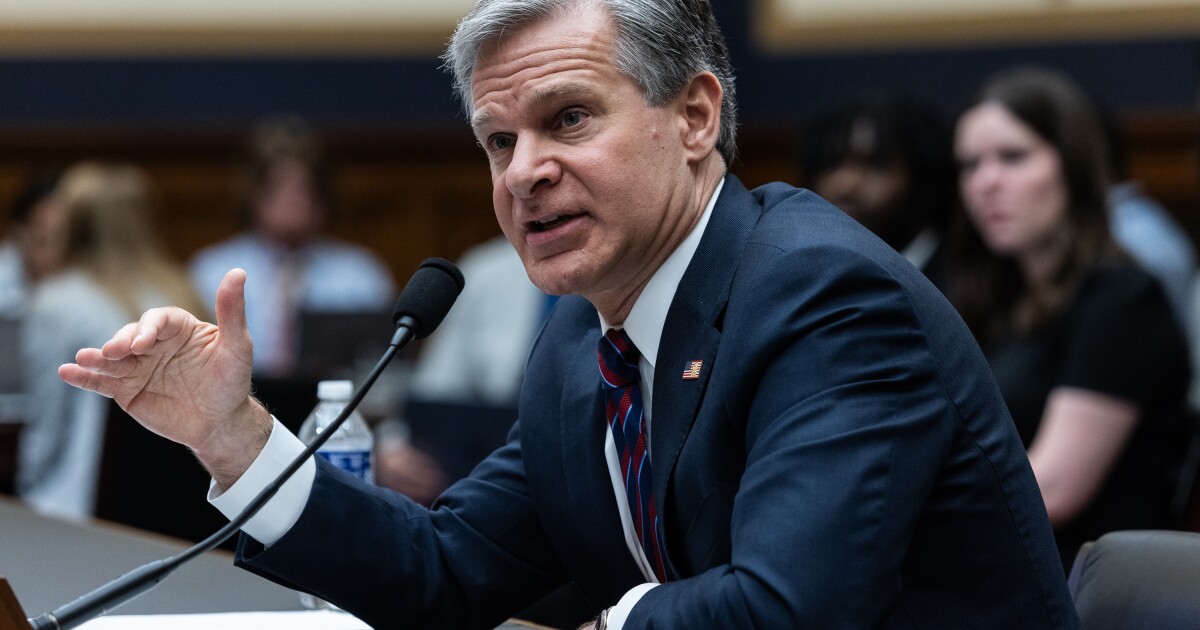

The Biden administration took a step toward addressing concerns about a controversial government surveillance tool this week by releasing an advisory panel’s report of recommended reforms to it.
President Joe Biden’s Intelligence Advisory Board concluded that the tool should see minimal reforms as it comes up for reauthorization at the end of this year, but certain Republican and Democrat Congress members are pushing for far more dramatic changes.
BIDEN AND REPUBLICANS DUKE IT OUT TO DEFINE THE ECONOMY
“If Congress fails to reauthorize Section 702, history may judge the lapse of Section 702 authorities as one of the worst intelligence failures of our time,” the report warned.
Four agencies in the intelligence community have access to the powerful tool, which is authorized under section 702 of the Foreign Intelligence Surveillance Act, but the Federal Bureau of Investigation’s access is by far the most problematic in the eyes of lawmakers.
Reports from the Justice Department’s inspector general and the director of national intelligence have repeatedly found the FBI misused section 702, which is designed to allow warrantless surveillance of foreigners but also allows for limited queries of U.S. persons relevant to foreign intelligence gathering.
The advisory board report found the FBI, because of its domestic purview within the intelligence community, has made a “larger percentage of U.S. person queries” compared to the other agencies that have access to the tool, such as the CIA.
The report noted, however, that searches of U.S. persons within already lawfully obtained section 702 data are a “preliminary exploratory tool” used only to determine if they are a target of a foreign operation or nefariously involved in one but emphasized that a warrant is required for any further querying once that determination is made.
It admitted that the FBI had in past years wrongly, but almost always unintentionally, searched names of those in the United States, which lawmakers have pointed out may violate the Constitution.
“Unfortunately, complacency, a lack of proper procedures, and the sheer volume of Section 702 activity led to FBI’s inappropriate use of Section 702 authorities, specifically U.S. person queries,” the report found.
Still, it was adamant that the FBI’s access to section 702 data was critical and losing it “would make America significantly less safe.”
The report comes after Director of National Intelligence Avril Haines declassified a court opinion in May that showed the FBI had improperly used section 702 more than 278,000 times in the last several years, including in its investigations into the Jan. 6 Capitol riot and protests related to the death of George Floyd.
Months prior, the Office of the Director of National Intelligence released a declassified report that also found the FBI conducted several unlawful searches and had also inappropriately queried the name of a congressman, who later identified himself as Rep. Darin LaHood (R-IL).
“Many Americans have rightfully lost faith in the FBI and the FISA process,” LaHood said at the time. “This incident along with other outlined abuses must be a wake-up call for the IC. Reauthorization of Section 702 without reform is a nonstarter.”
“The FBI has crossed the Rubicon,” Rep. Andy Biggs (R-AZ) said of the revelations earlier this year. “I will not allow the FBI to misuse privileged spying powers to conduct rogue surveillance on innocent Americans.”
Now, LaHood, Biggs, and a handful of other members from the House Intel and Judiciary Committees, the two committees with primary jurisdiction over section 702, are part of two working groups developing Congress’s plan for the fast-approaching reauthorization deadline.
Some Democrats, too, are intensely skeptical of reauthorization because of civil rights concerns.
In a hearing on the matter in July, Judiciary ranking member Rep. Jerry Nadler (D-NY) proudly declared that he had never voted to reauthorize section 702 in the past.
“I am deeply uncomfortable, as we all should be, with the legal fiction that it is permissible for the government to search our most private communications without a warrant, simply because they were aiming for non-U.S. persons overseas,” Nadler said at the hearing but added that he would “entertain” supporting it this year if the privacy concerns were fully addressed.
Nadler stands in a rare state of agreement with his counterpart, Judiciary Chairman Jim Jordan (R-OH), who also currently opposes reauthorization and is aiming to dramatically limit or fully restrict the FBI’s role in section 702.
In Haines’s most recent declassified report, released last month, she noted a small handful of violations with section 702 queries but also highlighted a drastic improvement in compliance with section 702’s guardrails, which the FBI said were improved upon in 2021.
However, Republicans in particular have also said such noticeable improvements reported by ODNI require more scrutiny because of concerns about the integrity of the counting methodology, according to an internal document reviewed by the Washington Examiner.
The Biden administration has nevertheless been clear since January that section 702 reauthorization is a “top legislative priority.”
The administration concurred with its panel’s latest report that the tool is indispensable for national security purposes, including terrorism and cybersecurity threats, and that it must be “reauthorized without new and operationally damaging restrictions,” according to national security adviser Jake Sullivan.
CLICK HERE TO READ MORE FROM THE WASHINGTON EXAMINER
In a statement, the FBI said, “We agree that Section 702 should be reauthorized in a manner that does not diminish its effectiveness, as well as reassures the public of its importance and our ability to adhere rigorously to all relevant rules.”
The bureau added, “We look forward to engaging with Congress on the recommendations.”





